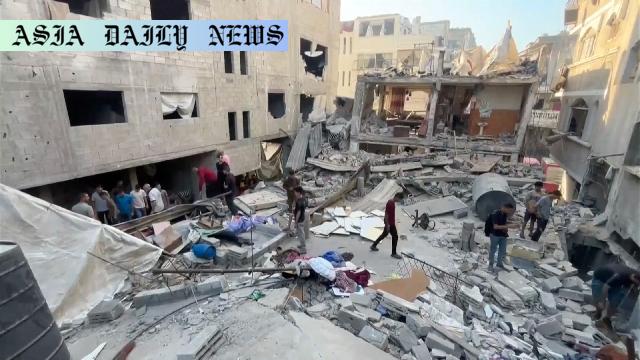Ceasefire talks continue between Israel and Hamas in Qatar amidst disputes, humanitarian concerns, and ongoing casualties.

Introduction to the Critical Situation in Gaza
The current escalation of violence in the Gaza Strip has gained global attention, with death tolls continuing to rise alarmingly. Recently, an Israeli delegation embarked on indirect talks with Hamas in Qatar to discuss a potential ceasefire. Despite stark disagreements between both parties, the discussions underscore a shared intention to resolve the humanitarian crisis and negotiate the release of hostages. The outcome of these talks could significantly shape the future of conflict resolution in the region.
Hamas’s Amendments to the Proposed Ceasefire
Media outlets have reported that Hamas has presented several amendments to the US-proposed 60-day truce. These include essential humanitarian measures such as delegating aid distribution to the UN and Red Crescent, ensuring impartiality and efficiency in reaching affected populations. Additionally, Hamas has demanded the withdrawal of Israeli troops to their January temporary ceasefire positions. Despite these pressing needs, Israel has refused to accept these conditions, further complicating progress.
Israel’s Perspective and Next Steps
While rejecting Hamas’s humanitarian demands, Israel remains committed to negotiations, particularly those related to the release of its hostages. Prime Minister Benjamin Netanyahu’s recent trip to the United States to meet with President Donald Trump highlights the importance Israel places on international partnerships in resolving this crisis. According to media sources, key contentious points still need reconciliation before an agreement can be reached, emphasizing that this process may take considerable time.
The Intensifying Humanitarian Crisis
The ongoing conflict continues to inflict devastating damage on civilians. Reports indicate that over 57,400 individuals have lost their lives since October 2023, with 80 casualties occurring in the last 24 hours alone. Local health authorities emphasize the urgent need for international aid and intervention to alleviate the suffering of Gaza’s residents. However, the unabated violence raises concerns about the prospects of achieving an effective and lasting ceasefire.
The Role of International Stakeholders
Global organizations and nations have been closely monitoring the developments in Gaza. Key stakeholders are advocating for resolutions that prioritize humanitarian aid and address the root causes of the conflict. Efforts by global bodies like the United Nations and non-governmental organizations like the Red Crescent further stress the importance of collaborative efforts in combating the crisis.
Conclusion: The Road to Resolution
While the ceasefire talks reflect a crucial step toward resolving the Gaza crisis, the stark differences between the negotiating parties present significant hurdles. The situation underscores the need for compromise, international mediation, and continued dialogue. Without these, the chances of achieving a peaceful resolution remain uncertain against the backdrop of a worsening humanitarian crisis.
Commentary
The Persistent Challenge of Ceasefire Negotiations
The Gaza conflict has once again spotlighted the immense challenges of resolving disputes in a region beset by historical, political, and humanitarian complexities. The recent ceasefire discussions in Qatar highlight the pressing need for dialogue to end the suffering endured by civilians on both sides. However, the fundamental differences in demands, particularly regarding humanitarian aid and military withdrawal, underscore just how tenuous a resolution might be.
The Role of International Influence
One noteworthy aspect of these discussions is the involvement of international parties, from the United Nations to the United States. Their role in facilitating communication, proposing pathways for peace, and providing humanitarian assistance is critical. However, it also invites questions about the efficacy and impartiality of such interventions, especially in areas where geopolitical interests often complicate matters further.
Reflections on the Human Cost
Perhaps most troubling in this conflict is the staggering human cost. The death toll, currently surpassing 57,400, serves as a grim reminder of the urgency required in these negotiations. The plight of civilians in Gaza, coupled with ongoing violence, demands an immediate cessation of hostilities. Yet, the road to such a ceasefire remains fraught with mistrust, competing interests, and political maneuvering.
Looking Forward
Despite these challenges, the persistence of dialogue offers a glimmer of hope. Achieving a ceasefire and addressing both humanitarian needs and long-term solutions will require unwavering commitment from all involved parties. While peace in the region may seem distant today, sustained efforts and international support could pave the way for a brighter and more stable future.


